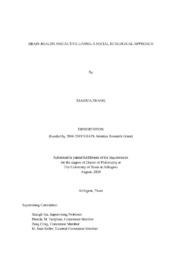
ATTENTION: The works hosted here are being migrated to a new repository that will consolidate resources, improve discoverability, and better show UTA's research impact on the global community. We will update authors as the migration progresses. Please see MavMatrix for more information.
Show simple item record
| dc.contributor.advisor | Gu, Xiangli | |
| dc.creator | Zhang, Xiaoxia | |
| dc.date.accessioned | 2022-01-20T18:09:13Z | |
| dc.date.available | 2022-01-20T18:09:13Z | |
| dc.date.created | 2020-08 | |
| dc.date.issued | 2020-08-11 | |
| dc.date.submitted | August 2020 | |
| dc.identifier.uri | http://hdl.handle.net/10106/30165 | |
| dc.description.abstract | Advocating active lifestyles and improving brain health across the lifespan is one of the universal and ultimate goals for Healthy People 2030. Unhealthy movement behaviors (physically inactive, excessive sedentary behavior, and insufficient sleep) and high prevalence of depression and cognitive impairment among young adults keep challenging higher education and public health systems. A comprehensive understanding of the determinants and mechanisms of movement behaviors and brain health is needed. Grounded in the social ecological model, this dissertation was to examine the behavioral and psychosocial mechanisms of brain health (depression and cognitive function) among young adults (18-45 years old).
Study 1 (Chapter 2) examined the effects of individual determinants (i.e., sociodemographic factors and weights status) and adherence to the 24-hour movement behavior guidelines on depression among 278 college students (187 females; Mage = 22.38). Participants completed the validated depression survey and wore the accelerometers (GT9X ActiGraph) assessing their 24-hour movement behaviors. Results revealed significant effects of individual determinants on the prevalence of depression, but not on adherence of the 24-hour movement behavior guidelines. No significant associations were found between adherence to the 24-hour movement behavior guidelines and the likelihood of depression (odds ratios ranged from 0.56 to 1.85; p > 0.05). It is concluded that adherence to the 24-hour movement behavior guidelines was not a direct determinant of the prevalence of depression
Study 2 (Chapter 3) further investigated the associations and psychosocial mechanisms among all levels of social ecological factors, 24-hour movement behaviors, and brain health outcomes (i.e., depression and cognitive function). A total of 111 college students (81 females) were included in this study. They completed assessments on social ecological factors, 24-hour movement behaviors, and depression. A subgroup (n = 60) performed a computerized cognitive function test assessing their spatial working memory. Results indicated no significant group differences of perceived competence and perceived social and built environmental support between groups who met and who did not meet the 24-hour movement behavior guidelines. Perceived competence was the most influential factor of depression and served as a mediator in the relationships of perceived social support and home environment with depression. Sedentary behavior exhibited significant associations with spatial working memory after controlling for social ecological factors. These findings suggest that improving young adults’ competence beliefs toward physical activity is an operational strategy to alleviate depressive symptoms among young adults. Sedentary behavior demonstrated to be beneficial for spatial working memory in this study while more evidence is warranted. | |
| dc.format.mimetype | application/pdf | |
| dc.language.iso | en_US | |
| dc.subject | Depressive symptoms | |
| dc.subject | Physical activity | |
| dc.subject | Sedentary behavior | |
| dc.subject | Sleep | |
| dc.subject | Cognitive function | |
| dc.subject | Built environment | |
| dc.title | BRAIN HEALTH AND ACTIVE LIVING: A SOCIAL ECOLOGICAL APPROACH | |
| dc.type | Thesis | |
| dc.degree.department | Kinesiology | |
| dc.degree.name | Doctor of Philosophy in Kinesiology | |
| dc.date.updated | 2022-01-20T18:09:14Z | |
| thesis.degree.department | Kinesiology | |
| thesis.degree.grantor | The University of Texas at Arlington | |
| thesis.degree.level | Doctoral | |
| thesis.degree.name | Doctor of Philosophy in Kinesiology | |
| dc.type.material | text | |
| dc.creator.orcid | 0000-0001-5076-9035 | |
Files in this item
- Name:
- ZHANG-DISSERTATION-2020.pdf
- Size:
- 1.082Mb
- Format:
- PDF
This item appears in the following Collection(s)
Show simple item record


